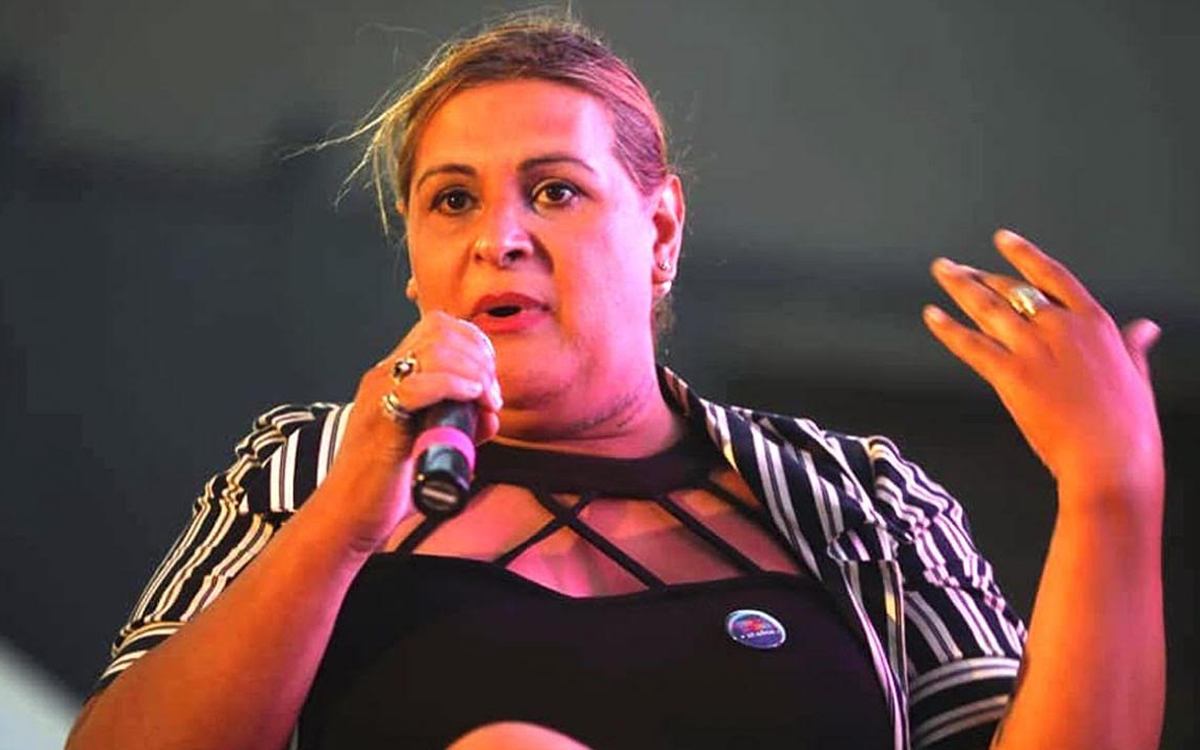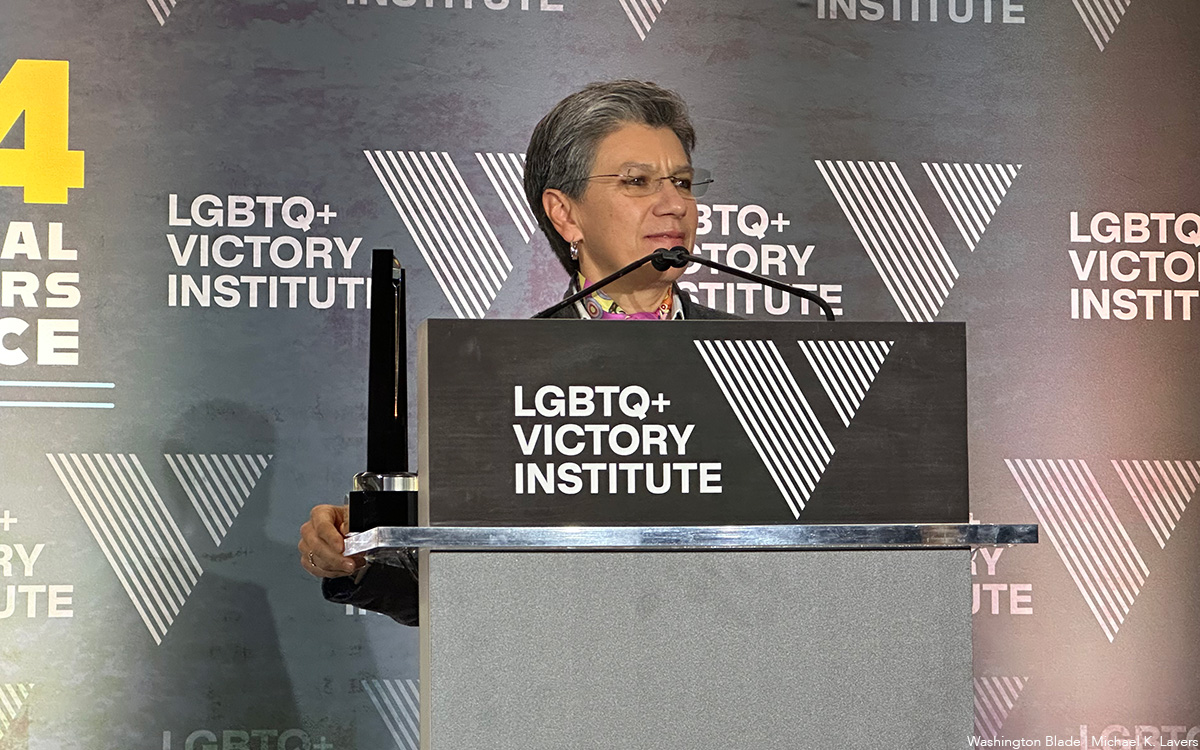South America
Prominent transgender activist murdered in Argentina
Alejandra Ironici found dead in home on Sunday

The murder of a prominent transgender activist in Argentina has sparked outrage across the country.
Clarín, an Argentine newspaper, reports Alejandra Ironici was found dead in her home in Santa Fe, a city in Santa Fe province that is roughly 285 miles northwest of Buenos Aires, the country’s capital, on Sunday.
Ironici’s 22-year-old nephew found her body at around 11 p.m. local time (10 p.m. ET).
Reports indicate Ironici’s body showed signs that she had been beaten and burned. A 32-year-old man with whom Ironici had been in a relationship has been charged aggravated feminicide and transfemicide.
Ironici, 45, in 2012 became the first trans person in Argentina to legally change their gender on their national ID document without a court order. She was also the first trans woman to undergo sex reassignment surgery at a public hospital in the country.
Ironici was the first openly trans person elected to Santa Fe’s city government.
Activists who participated in a march in Santa Fe on Monday demanded justice for Ironici.
Esteban Paulón, an LGBTQ and intersex activist in Argentina who lives in Santa Fe province, on Tuesday told the Washington Blade that he knew Ironici for more than 20 years.
Paulón said Ironici “more than anything was a militant, was a committed person who gave everything she had and more to the community.”
“She was one of the biggest motivators behind many of the advances that we have achieved in the province,” Paulón told the Blade.
“Alejandra Ironici’s femicide is evidence that machismo, patriarchy and violence is taking lives with impunity,” added Paulón.
ATTTA (Asociación de Travestis, Transsexuales y Transgéneros de Argentina) in a statement noted Pancha Quebracha, a well-known drag queen in Mar del Plata, a city in Buenos Aires province, was found dead inside her home on Sunday. ATTTA pointed out violence and discrimination based on gender identity remains commonplace in Argentina, even though the country remains at the forefront of the global LGBTQ and intersex rights movement.
“The life expectancy for trans women in Argentina is 41 years,” said ATTTA. “Our community faces violent situations that often times end in transfemicides because of machismo and patriarchal impunity.”
ATTTA in its statement also calls upon Argentina’s government to strengthen existing laws that are designed to protect LGBTQ and intersex people and to implement “an agenda of public policies where nobody is left behind.”
Colombia
Colombia avanza hacia la igualdad para personas trans
Fue aprobado en Comisión Primera de la Cámara la Ley Integral Trans

En un hecho histórico para los derechos humanos en Colombia, la Comisión Primera de la Cámara de Representantes aprobó en primer debate el Proyecto de Ley 122 de 2024, conocido como la Ley Integral Trans, que busca garantizar la igualdad efectiva de las personas con identidades de género diversas en el país. Esta iniciativa, impulsada por más de cien organizaciones sociales defensoras de los derechos LGBTQ, congresistas de la comisión por la Diversidad y personas trans, representa un paso decisivo hacia el reconocimiento pleno de derechos para esta población históricamente marginada.
La Ley Integral Trans propone un marco normativo robusto para enfrentar la discriminación y promover la inclusión. Entre sus principales ejes se destacan el acceso a servicios de salud con enfoque diferencial, el reconocimiento de la identidad de género en todos los ámbitos de la vida, la creación de programas de empleo y educación para personas trans, así como medidas para garantizar el acceso a la justicia y la protección frente a violencias basadas en prejuicios.
Detractores hablan de ‘imposición ideológica
Sin embargo, el avance del proyecto no ha estado exento de polémicas. Algunos sectores conservadores han señalado que la iniciativa representa una “imposición ideológica”. La senadora y precandidata presidencial María Fernanda Cabal anunció públicamente que se opondrá al proyecto de Ley Integral Trans cuando llegue al Senado, argumentando que “todas las personas deben ser tratadas por igual” y que esta propuesta vulneraría un principio constitucional. Estas declaraciones anticipan un debate intenso en las próximas etapas legislativas.
El proyecto también establecelineamientos claros para que las instituciones públicas respeten el nombre y el género con los que las personas trans se identifican, en concordancia con su identidad de género, y contempla procesos de formación y sensibilización en entidades estatales. Además, impulsa políticas públicas en contextos clave como el trabajo, la educación, la cultura y el deporte, promoviendo una vida libre de discriminación y con garantías plenas de participación.
¿Qué sigue para que sea ley?
La Ley aún debe superar varios debates legislativos, incluyendo la plenaria en la Cámara y luego el paso al Senado; pero la sola aprobación en Comisión Primera ya constituye un hito en la lucha por la igualdad y la dignidad de las personas trans en Colombia. En un país donde esta población enfrenta altos niveles de exclusión, violencia y barreras estructurales, este avance legislativo renueva la esperanza de una transformación real.
Desde www.orgullolgbt.co, celebramos este logro, invitamos a unirnos en esta causa impulsándola en los círculos a los que tengamos acceso y reiteramos nuestro compromiso con la visibilidad, los derechos y la vida digna de las personas trans. La #LeyIntegralTrans bautizada “Ley Sara Millerey” en honor de la mujer trans recientemente asesinada en Bello, Antioquia (ver más aquí); no es solo una propuesta normativa: es un acto de justicia que busca asegurar condiciones reales para que todas las personas puedan vivir con libertad, seguridad y respeto por su identidad.
Colombia
Claudia López running for president of Colombia
Former Bogotá mayor married to Sen. Angélica Lozano

Former Bogotá Mayor Claudia López has announced she is running for president of Colombia.
“We begin today and we will win in a year,” she said in a social media post on June 3.
View this post on Instagram
López, 55, was a student protest movement leader, journalist, and political scientist before she entered politics. López returned to Colombia in 2013 after she earned her PhD in political science at Columbia University.
López in a speech she gave last December after the LGBTQ+ Victory Institute honored her at its annual International LGBTQ Leaders Conference in D.C. noted Juan Francisco “Kiko” Gomez, a former governor of La Guajíra, a department in northern Colombia, threatened to assassinate her because she wrote about his ties to criminal gangs.
A Bogotá judge in 2017 convicted Gómez of ordering members of a paramilitary group to kill former Barrancas Mayor Yandra Brito, her husband, and bodyguard and sentenced him to 55 years in prison.
López in 2014 returned to Colombia, and ran for the country’s Senate as a member of the center-left Green Alliance party after she recovered from breast cancer. López won after a 10-week campaign that cost $80,000.
López in 2018 was her party’s candidate to succeed then-President Juan Manuel Santos when he left office. López in 2019 became the first woman and first lesbian elected mayor of Bogotá, the Colombian capital and the country’s largest city.
López took office on Jan. 1, 2020, less than a month after she married her wife, Colombian Sen. Angélica Lozano. (López was not out when she was elected to the Senate.) López’s mayorship ended on Dec. 31, 2023. She was a 2024 Harvard University Advance Leadership Initiative fellow.
The first-round of Colombia’s presidential election will take place on May 31, 2026.
The country’s 1991 constitution prevents current President Gustavo Petro from seeking re-election.
López declared her candidacy four days before a gunman shot Sen. Miguel Uribe, a member of the opposition Democratic Center party who is seen as a probable presidential candidate, in the head during a rally in Bogotá’s Fontibón neighborhood.
She quickly condemned the shooting. López during an interview with the Washington Blade after the Victory Institute honored her called for an end to polarization in Colombia.
“We need to listen to each other again, we need to have a coffee with each other again, we need to touch each other’s skin,” she said.
López would be Colombia’s first female president if she wins. López would also become the third openly lesbian woman elected head of government — Jóhanna Sigurðardóttir was Iceland’s prime minister from 2009-2013 and Ana Brnabić was Serbia’s prime minister from 2017-2024.
Chile
Gay pharmacist’s murder sparks outrage in Chile
Francisco Albornoz’s body found in remote ravine on June 4

The latest revelations about the tragic death of Francisco Albornoz, a 21-year-old gay pharmacist whose body was found on June 4 in a remote ravine in the O’Higgins region 12 days after he disappeared, has left Chile’s LGBTQ community shocked.
The crime, which was initially surrounded by uncertainty and contradictory theories, has taken a darker and more shocking turn after prosecutors charged Christian González, an Ecuadorian doctor, and José Miguel Baeza, a Chilean chef, in connection with Albornoz’s murder. González and Baeza are in custody while authorities continue to investigate the case.
The Chilean Public Prosecutor’s Office has pointed to a premeditated “criminal plan” to murder Albornoz.
Rossana Folli, the prosecutor who is in charge of the case, says Albornoz died as a a result of traumatic encephalopathy after receiving multiple blows to the head inside an apartment in Ñuñoa, which is just outside of Santiago, the Chilean capital, early on May 24. The Prosecutor’s Office has categorically ruled out that Albornoz died of a drug overdose, as initial reports suggested.
“The fact that motivates and leads to the unfortunate death of Francisco is part of a criminal plan of the two defendants, aimed at ensuring his death and guaranteeing total impunity,” Folli told the court. “The seriousness of the facts led the judge to decree preventive detention for both defendants on the grounds that their freedom represents a danger to public safety.”
Prosecutors during a June 7 hearing that lasted almost eight hours presented conservations from the suspects’ cell phones that they say showed they planned the murder in advance.
“Here we already have one (for Albornoz.) If you bring chloroform, drugs, marijuana, etc.,” read one of the messages.
Security cameras captured the three men entering the apartment where the murder took place together.
Hours later, one of the suspects left with a suitcase and a shopping cart to transport Albornoz’s body, which had been wrapped in a sleeping bag. The route they followed to dispose of the body included a stop to buy drinks, potato chips, gloves, and a rope with which they finally descended a ravine to hide it.
Advocacy groups demand authorities investigate murder as hate crime
Although the Public Prosecutor’s Office has not yet officially classified the murder as a hate crime, LGBTQ organizations are already demanding authorities investigate this angle. Human rights groups have raised concerns over patterns of violence that affect queer people in Chile.
The Zamudio Law and other anti-discrimination laws exist. Activists, however, maintain crimes motivated by a person’s sexual orientation or gender identity are not properly prosecuted.
“This is not just a homicide, it is the cruelest expression of a society that still allows the dehumanization of LGBTQ+ people,” said a statement from Fundación Iguales, one of Chile’s main LGBTQ organizations. “We demand truth, justice, and guarantees of non-repetition.”
The Movement for Homosexual Integration and Liberation (Movilh), meanwhile, indicated that “since the first day the family contacted us, we have been in conversations with the Prosecutor’s Office so that this fatal outcome is thoroughly investigated, including the possible existence of homophobic motivations or components.”
The investigation into Albornoz’s murder continues, and the court has imposed a 90-day deadline for authorities to complete it.
-

 U.S. Supreme Court1 day ago
U.S. Supreme Court1 day agoSupreme Court to consider bans on trans athletes in school sports
-

 Out & About2 days ago
Out & About2 days agoCelebrate the Fourth of July the gay way!
-

 Maryland5 days ago
Maryland5 days agoSilver Spring holds annual Pride In The Plaza
-

 Opinions5 days ago
Opinions5 days agoSupreme Court decision on opt outs for LGBTQ books in classrooms will likely accelerate censorship











